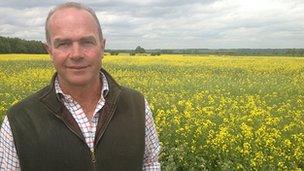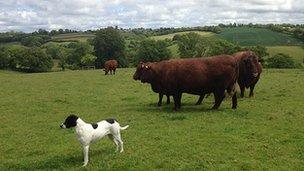EU 'millionaire' farm subsidies likely to stay
- Published

Stuart Meeson says subsidies enable farmers to meet the growing world demand for food
Stuart Meeson is a rather happy farmer. It looks as though the 1m-euro subsidy for the farm he manages in Lincolnshire will remain intact under current EU reform plans.
The European Commission wanted to cap single farm payment subsidies at 300,000 euros (£257,000; $397,000) a year, but governments led by the UK and Germany are reported to have crushed that proposal.
Big farmers are often the most efficient, they said, and should not be penalised for that.
The UK and Germany have many big farms, efficient at producing food intensively, and the big landowners are a powerful lobby in both countries. In contrast, France has many small, traditional farms, often less efficient.
It is the latest blow to the Commission’s plans, as its master scheme to radically reform the Common Agricultural Policy approaches an endgame, with key negotiations in Luxembourg next week.
It is already clear that the Commission’s original proposals for “greening” the CAP - forcing farmers to earn 30% of their subsidies by protecting the environment - have been heavily watered down after resistance from big farmers.
The Commission wanted farmers to safeguard pasture land, diversify crops and leave 7% of farmland for wildlife.
Paler shade of green?
Irish Agriculture Minister Simon Coveney, who is steering the talks, told me compromises would be needed to seal a deal, but environmentalists complain that it is again the environment that seems to have been compromised.
The latest proposal from the Irish presidency suggests that a single tree in a field should qualify for the same subsidy as 200sq m (2,153 sq ft) of crop land left for wildlife.
David Baldock from the Institute for European Environmental Policy told me: “Given the widespread presence of trees and hedges in several parts of Europe, it would appear likely that farmers over large areas would have to do nothing at all to qualify for their greening payment. This seems pretty outrageous, since it is meant to be a new initiative and a major change in the CAP.”
It also seems that a proposal to pay farmers twice under different budget headings for the same environmental practices remains on the negotiating table.
A spokesman for the Commission diplomatically said: “There is a risk of a dangerous dilution of greening. We remain optimistic that a political deal is still feasible before the end of the month."
Time is running out. The parameters of the overall budget have already been set by heads of state, with an overall cut of about 12% in the agriculture budget.
Diverse land use

West Yeo Farm, Devon: Will EU subsidies continue to safeguard rare habitats?
The talks really matter to farmers and the countryside. I visited two farms in the UK to gauge reaction.
In Lincolnshire, Stuart Meeson was cautiously optimistic. The farm he runs on behalf of a major local landowner is highly productive and profitable. He says he manages between 5% and 7% of the land for wildlife, especially to encourage grey partridges for shooting. Without the 1m-euro payments he would be tempted to put even more land into food production, he says.
“We employ an awful lot of people in the area. As a farming company we need to produce food competitively for the world market. With an ever-growing population for the world, if we are going to feed it, we need some subsidies which are applied to virtually all countries.” But does he really need 1m euros a year? That remains to be decided.
At the other end of the spectrum is the 29-hectare (71-acre) West Yeo Farm near Tiverton in Devon. It receives 15,000 euros a year, half of it for encouraging wildlife. The farmer, Kate Palmer, has reinstated a stretch of culm grassland, a habitat unique to the West Country, thanks to the presence of a soft sooty coal in the soil. It is grazed when the flowers are over by a herd of rare-breed Ruby Red Devon cattle.
“I really believe the public is prepared to pay subsidies to keep farmland like this for our grandchildren,” she said, among the ragged robin and marsh orchids. “The farming organisations don’t seem to represent farms like ours, they seem only to be interested in the intensive farmers who have taken away our wildlife.”
So how green will the greening of the CAP really be? The “trialogue” of MEPs, ministers and Commission will be wrestling over it from Monday to Wednesday. Doubtless if a deal is done it will be declared a triumph, but the details may not emerge until Thursday.
Follow Roger on Twitter, external.
- Published14 May 2013
- Published13 March 2013
- Published1 July 2013